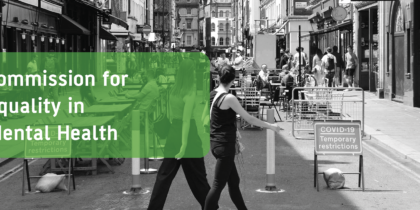Mental health services work less well for people from poorer areas and from Black communities in England, according to an analysis published today by Centre for Mental Health.
Inequalities of experience and outcomes, the third briefing produced for the Commission for Equality in Mental Health, explores why groups and communities with higher rates of mental ill health often get the least effective support.
People from Black communities in England are less likely to get access to NHS talking therapy services and less likely to recover if they start treatment. They are many times more likely than white people to be sectioned under the Mental Health Act, to be placed on Community Treatment Orders, continuing the use of coercive powers after they leave hospital, and to have repeated compulsory hospital admissions. Disabled people and people living in more deprived areas are also less likely to have a good outcome from talking therapies.
The briefing explores why these inequalities happen and why they persist. It finds that poor experiences of mental health care often start with poor access to support. If people have to battle for mental health support until they reach crisis point, their first experiences of treatment are more likely to be coercive and traumatic.
For people from Black communities, this reflects and magnifies experiences of systemic racism in everyday life: for example from repeated exposure to ‘micro-aggressions’ both inside and outside mental health services.
Poorer experiences of mental health support are also reported by many other groups, including LGBT+ people, who find their experiences are not well understood by services, and autistic people, who find services poorly adjusted to their needs. People in the criminal justice system are also more likely to have had negative experiences of mental health care in the past, as well as difficulties getting help for their mental health while in prison or after their release.
The briefing notes that the NHS in England is now taking action to tackle mental health inequalities through its Advancing Mental Health Equalities programme. This will need commitment, money and time to be successful in making a sustained change in people’s experiences and outcomes.
The briefing sets out key elements of a system designed to achieve equality of outcomes from mental health support. They include a much higher level of voluntary and community sector involvement in mental health support: not just as an add-on to mainstream services but as a key part of the system. They also include a commitment to meet all mental health needs, building a trauma-informed and culturally competent workforce, and greater accountability and transparency within health and care systems for reducing inequalities.
Centre for Mental Health chief executive Sarah Hughes said: “It is not right that many of the people and communities whose mental health is at greatest risk in our society get the least effective help and have the worst experiences of care. Too many people find that the help on offer doesn’t work for them, or they cannot get access to the support they need.
“The Advancing Mental Health Equalities programme is an important step forward in putting this higher up the agenda for the NHS. It will need sustained commitment from system leaders across the country to succeed. And it must lead to genuine system change so that no one is treated less well because of who they are, where they’re from or what has happened to them.
“Next month we will publish the final report of the Commission for Equality in Mental Health. It will set out recommendations for a system designed for mental health equality, from local communities to national policies.”




